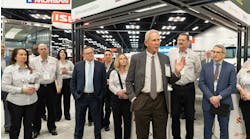During a recent earnings call, ZF’s CEO Wolf-Henning Scheider announced that he expects further momentum following the acquisition of commercial vehicle brake manufacturer WABCO, which was completed on May 29, 2020.
WABCO was integrated into the company as the new Commercial Vehicle Control Systems division and contributes to positioning ZF as a system supplier in the commercial vehicle sector as well and to expanding its portfolio for customers in this segment. The integration process, which was started immediately after the closing, is running according to plan, ZF announced, “and progressing particularly well in the areas of highly advanced driver assist systems and autonomous functions for commercial vehicles.”
In addition, ZF announced it is selectively reducing capacities worldwide to adjust to weaker demand and to anticipate the trend toward greater electrification. In Germany, the company has concluded a “Transformation Collective Agreement” with works councils and unions for this purpose. It stipulates that ZF will not make any compulsory redundancies or close any sites in Germany until the end of 2022. In return, the company can reduce employees’ working hours covered by collective bargaining agreements by up to 20 percent and offer targeted severance packages and part-time work for older employees in Germany. Since mid-2019, ZF has reduced its global workforce by 5,300, including 3,800 since the beginning of this year.
ZF also reported that it expects the market environment to remain “very heterogeneous” in the second half of the year.
“Although Europe is showing signs of recovery at the moment, it will likely be the most critical region in the next few years due to declining vehicle exports and stricter emissions regulations,” stated Scheider, noting that the high number of COVID-19 infections in the Americas prompts uncertainty. “China and Asia are currently the most promising markets. Business in this region is coming back very strongly and is helping us to increase our sales again,” he added.
Overall, the global economic situation remains tense. ZF does not expect the market to recover to 2019 levels in the next three years. Scheider anticipated a slow upswing for heavy commercial vehicles: in 2023, expected sales of 3.2 million heavy trucks will be 360,000 vehicles below the 2019 figure (3.56 million), the company stated.
“This is crucial to continue investing in future technologies such as e-mobility and autonomous driving, to win business and to further strengthen our financial independence for the future,” Scheider emphasized.



